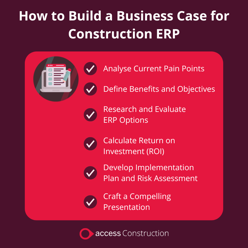How to Build A Business Case for Construction ERP – Step-by-Step
It is no secret that the construction industry has a reputation for being hesitant towards new technology. This reluctance is particularly concerning at a time when construction productivity remains flat and business insolvencies are at a record high.
With ERP being a significant investment for construction companies, this problem is even more compounded. The need to embrace construction technology is undeniable, with many successful construction businesses implementing new tech to stay profitable and market-leading.
In this article, we break down how you can make the business case for construction ERP to get your investors and key stakeholders on-board and the ball rolling.
A Difficult Future Ahead for Construction
Before anything else, we must look at the data as it paints a very clear picture. Construction productivity has barely budged in the last half-century.
In fact, a 2023 RICS report revealed that 45% of construction companies haven't seen any improvement in productivity. The report also highlighted that increased investment in data and digitalisation is the second most important strategy for boosting productivity.
While other sectors are leveraging digital advancements to streamline processes and increase efficiency, construction has been slow to capitalise on the opportunities presented by "Industry 4.0."
The message is clear: companies that fail to adapt to new technologies risk falling behind, a fate witnessed in other industries. To ensure survival and growth, the construction sector must embrace innovation and become a force for disruption.
Why ERP Will Transform the Future of Construction
One of the first questions your stakeholders and team may ask, is why ERP?
In recent years, construction’s rapidly changing landscape has led many businesses to seek out a single all-in-one platform for construction management. Above all, one that replaces the complexity and cost of owning and managing disparate software for each and every operational need.
As a result, Enterprise Resource Planning (ERP) software has emerged as the pivotal choice for businesses striving towards digital transformation, unifying disconnected data and systems into one comprehensive system.
For those already using it, ERP has become a cornerstone for business operations, allowing them to unify financials and workforce management, improve operational oversights and strengthen their decision-making processes.

4 Benefits Of Using ERP In Construction
1. Significantly Boosted Productivity
ERP streamlines processes, automates tasks, and improves communication across the construction project lifecycle. This can lead to significant time and cost savings, alongside increased productivity.
The statistics speak for themselves here, with workers spending 30% of their workday searching for information. A centralised data source eliminates this inefficiency, garnering widespread support.
Additionally, time is saved on repetitive or manual tasks, and entire teams working on construction schemes can view the same data and updates in real-time, leading to faster-moving projects.
2. Increased Safety
ERP helps to improve safety on construction sites by providing real-time data on hazards, risks, and compliance. This can help to prevent accidents and injuries in a sector plagued by health and safety concerns.
This directly helps on-site workers feel safer and happier to work, boosting wellbeing and improving what can be a sometimes challenging work culture.
3. Better Build Quality
ERP helps to improve the quality of construction projects themselves by providing accurate information and data. This can lead to fewer defects and rework, a significant contributor to productivity loss, and result in improved relationships and repeat projects from clients.
4. Easy Collaboration
There are endless benefits to improving collaboration in construction projects, and digital technologies can help to improve collaboration between different stakeholders in the construction project lifecycle, such as architects, engineers, contractors, and owners.
This leads to more confident decision-making and more efficient execution of projects.
Want to learn more about the benefits of construction ERP? take a look at our article The benefits of construction ERP >
Access Coins is the complete ERP built for construction
Packed with features specific to the construction industry, Access Coins ERP gives your business total visibility across your projects.

The Business Case For Construction ERP
Moving to a modern Construction ERP is not just a technological change for your organisation; rather a strategic move that promises a multitude of benefits for your construction company.
Ask yourself questions that can help analyse current weak points in the organisation which may be best improved with software.
Often the biggest obstacle when considering a digital transformation is getting the wider team, c-suite and investors on-board. When making the case for ERP adoption with your stakeholders and teams, consider the following points to help secure buy-in:
- User-Centric Approach: Understand the pulse of your organisation by delving into the needs of each department and user.
- Organisational Buy-In: Prioritise achieving organisational buy-in by involving end-users in software evaluations. Their insights offer valuable perspectives that may not have been considered by leadership.
- Communication: Effectively communicate the purpose of adopting ERP software, emphasising how specific features will simplify tasks and boost productivity.
- Connected Solutions for Efficiency: Highlight the importance of widespread adoption. Connected software solutions only realise their full potential when utilised across the organisation
- Time Savings and Productivity Appeal to the universal desire for efficiency by showcasing how a unified software system can save time for everyone in the organisation.
Making the Business Case For Construction ERP – Step-by-Step
Here's a step-by-step guide to building a compelling business case for implementing an ERP system in your construction company:
1. Analyse Current Pain Points
Start by thoroughly assessing your current processes. Look for inefficiencies, bottlenecks, and areas with manual work prone to errors. Common pain points in construction include siloed systems, inaccurate data, difficulty tracking costs, poor communication and limited visibility of projects.
Don't just list problems; quantify their impact. For example, estimate the cost of rework due to inaccurate material estimates or delays caused by poor communication.
2. Define Benefits and Objectives
Ensure the new ERP aligns with your company's overall strategy. Is your goal to improve efficiency, increase profitability, or expand into new markets?
Set clear, measurable goals for the ERP implementation. These could include reducing project costs by X%, improving on-time project completion by Y%, or streamlining financial reporting by Z%.
3. Research and Evaluate ERP Options
Construction projects are complex. Look for ERP solutions specifically designed for the industry, with features like project management, field service, and equipment tracking.
Consider not just software licenses, but also implementation costs, ongoing maintenance, and training. Get quotes from several vendors.
4. Calculate Return on Investment (ROI)
Estimate the quantifiable financial benefits of the ERP. This could include cost savings from reduced rework, improved resource allocation, or streamlined processes. Factor in potential revenue gains from faster project completion or increased bidding competitiveness.
While ROI focuses on financials, consider the qualitative benefits as well. Improved employee productivity, better decision-making, and enhanced customer satisfaction can translate to long-term financial gains.
5. Develop Implementation Plan and Risk Assessment
Consider a phased implementation plan to minimize disruption and ensure user adoption.
Identify potential risks associated with the implementation, such as data migration challenges or employee resistance to change. Develop a plan to mitigate these risks.
6. Craft a Compelling Presentation
Briefly highlight the key pain points, proposed solution, and expected benefits. Back up your case with clear data and financial analysis. Use charts and graphs to present complex information effectively. Emphasize how the ERP will create value for the company, not just add cost.
By following these steps and building a well-supported business case, you can increase your chances of securing approval for an ERP system that will transform your construction business.
Want to know more about purchasing construction ERP? Download our Buyer’s Guide to Construction Management Software >

Access Coins is The All-In-One ERP for Construction
Access Coins is a comprehensive, all-in-one ERP system that allows construction professionals to manage risk, capture and manage data and streamline day-to-day management of their business.
Designed specifically for the challenges of the construction industry, Access Coins’ integrated modules are built to manage the entire lifecycle of a construction project.
With real-time data insights at its core, Access Coins gives construction businesses total visibility over their projects. Confidently make data-driven decisions that can help boost margins, assess profitability and manage risk.
Latest Construction ERP blogs and resources
Read our latest content on all things construction ERP software covering key industry questions and trends.









